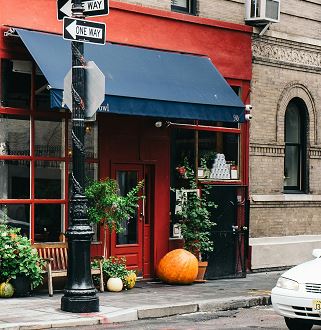What happens when you live in your store, shop, studio, or business premises in New York City? Can the landlord evict you in a commercial eviction proceeding?
July 13, 2025
For the next few months in 2025, I am going to spend some time in these pages cross-promoting my very popular podcast, the Tenant Law Podcast – listen on Apple, Spotify, YouTube, or wherever there are awesome podcasts. This blog post expands on Tenant Law Podcast Episode 22.
Today’s case is Glebow Realty v. Dietrich, 81 Misc.3d 138(A) [App Term 1st 2023], a fairly recent Appellate Term First Department case.
First let’s set the stage with some context.
Commercial tenants in New York City have far fewer rights than residential tenants. Commercial leases and commercial landlord-tenant relationships are treated like regular business relationships between sophisticated parties and, typically, whatever is agreed to in a commercial lease is what the tenant is held to.
But what makes a tenancy commercial, as opposed to residential? What happens when you are living in a space, and the landlord knows you are living in a space, but your lease is for a store or an office? Your lease says on the top “Commercial Lease” or “Store Lease” or “Office Lease”, does that mean that you are a commercial tenant and you have way less rights than if your lease properly acknowledges that you are a residential tenant?
In today’s case, the landlord brought a commercial holdover case, an eviction case, for a store, against a tenant in the Commercial Part of the Civil Court of the City of New York. The tenant was using the premises for clothing design and making couture clothing. The lower court found that the evidence at trial established that: the tenant lived in the premises since 2016; the premises were furnished with a dinning table, bed, and television; the landlord installed a shower, stove, and refrigerator; and the tenant installed a sink and countertop with the landlord’s knowledge and consent. The landlord was in the premises on about 30 occasions dealing with leaks. Therefore, the trial court determined that the landlord knew that the tenant was living there.
The court dismissed the case. The landlord appealed and the appellate court upheld the dismissal of the case by the lower court, holding that the rule from earlier appellate case law is that:
“Despite the commercial nature of the lease, the finding that landlord knew of or acquiesced in tenant’s residential use of the store front premises has sufficient support in the record and, accordingly, the petition was properly dismissed.”
Tenant Takeaway time.
There is a strong legislative policy that all summary proceedings (eviction cases) to recover residential premises be commenced in the Housing Part where a residential tenant’s rights will be protected. Artykova v. Avramenko, 37 Misc.3d 42 [App Term 2d 2012]. While the existence of a use restriction clause in the lease is certainly a factor to be considered in determining whether your use of the premises is residential or comemrcial, the court will always look at two things: (1) the actual use; and (2) whether the landlord knew about and acquiesced in the actual use. Mesiti v Upam Realty Corp., 185 AD2d 336 [2d Dept 1992].
What you need to do if you find yourself living in your store/office/workshop is to create as much of a record as you can, as you go along, showing that the landlord either cooperated with you living there, or that the landlord knew you lived there, or at the very least that the landlord should have known that you lived there based upon the circumstances. The landlord cannot simply feign ignorance. Let’s say the landlord sends a plumber to fix your shower or a repairman to fix your stove. Send and save a text, email, letter, whatever you use to communicate that says (assuming such is true) something like: “I really need my shower fixed, I cannot go out in the morning without taking a hot shower.” Or, “thank you for fixing my store, I almost never order in, I like to make my own dinners.”
I am NOT suggesting that it is a great housing solution to live in your shop. What I am saying is that this is New York City, it is full of creators, and a lot of people do live in their shops. I was surprised at how many recent published cases there are recently on the topic.
Moreover, there are other implications of turning a store into a living unit. If that store, as a residence, kicks the number of residential units in the building up to six or more (even if those units are illegal), then the building might now be considered Rent Stabilized and maybe nobody can be evicted.
Let’s end on this note, if you are living in your store or shop and you begin to have landlord tenant problems, at the very least you should understand that you cannot be sued in the commercial courts for what is essentially a housing matter.
Respectfully submitted,






